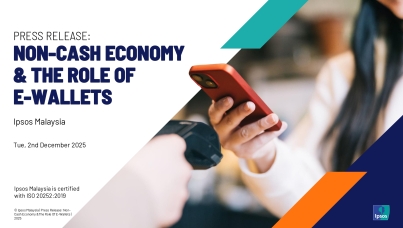![[PRESS RELEASE] - Non-Cash Economy & The Role of E-Wallets](/sites/default/files/styles/main_image_612x500/public/ct/news_and_polls/2025-09/%5BPRESS%20RELEASE%5D%20-%20Non-Cash%20Economy%20%26amp%3B%20The%20Role%20of%20E-Wallets.png?itok=W8sEQjwn)
![[PRESS RELEASE] - Non-Cash Economy & The Role of E-Wallets](/sites/default/files/styles/main_image_612x500/public/ct/news_and_polls/2025-09/%5BPRESS%20RELEASE%5D%20-%20Non-Cash%20Economy%20%26amp%3B%20The%20Role%20of%20E-Wallets.png?itok=W8sEQjwn)
[PRESS RELEASE] - Non-Cash Economy & The Role of E-Wallets
The findings from the study reveal:
- More than half of Malaysians are using non-cash payment
- More youths are using e-wallets
- People are increasingly dependent on e-wallets
- Higher usage of e-wallet for retail purchases
- Touch N’ Go remains the most used channel, followed by MAE
Arun Menon, Managing Director, Ipsos Malaysia mentions:
"Non-cash payment channels are experiencing robust growth in Malaysia, with over half the population using them. E-wallets, in particular, have seen the highest growth, and a significant number of Malaysians use them daily, suggesting that the increase in e-wallet adoption during and after the COVID-19 pandemic is sustainable.
The most common e-wallet transactions are for food and beverage outlets, retail purchases, and toll payments. Food delivery via e-wallets has decreased as more people return to physical stores. Touch 'n Go remains the leading e-wallet brand by a significant margin, followed by MAE in second place. While there have been minor shifts in user preferences, the average number of e-wallet brands used per person has remained stable at approximately two.
However, 45% of Malaysians still rely solely on cash for payments. To achieve the Malaysian government's goal of a digital economy and a 90% cashless payment rate by 2025, non-cash payment options, especially e-wallets, need to become more inclusive and accessible to those currently excluded.
Initiatives like MyDigital and the Cashless Society program aim to transform Malaysia into a digital economy by 2030, which includes promoting the widespread use of electronic payments in government agencies."



